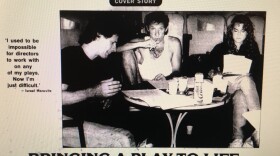
Rhaina Cohen
Rhaina Cohen is a producer and editor for NPR's Enterprise Storytelling unit, working across Embedded, Invisibilia, and Rough Translation.
Previously, she was a producer for Hidden Brain, where she brought together narrative journalism and social science research. Some of the most rewarding stories she worked on include those about why the #MeToo movement took off when it did, how American masculinity makes it harder for men to build close friendships and why we sometimes make decisions that baffle us. Cohen joined NPR as an intern for Planet Money.
She periodically writes for outlets such as The Atlantic, The Washington Post, and The New Republic. Her article about people who make a friend their life partner was selected by Longreads as one of the best articles of 2020. She received some of her earliest journalism training as a research assistant for authors. She worked on the New York Times bestselling book All The Single Ladies: Unmarried Women and the Rise of an Independent Nation and the biography Michelle Obama: A Life.
Cohen was a Marshall Scholar at Oxford, where she earned a master's in comparative social policy (and while there, competed in a dance style that hasn't yet taken off in the United States: acrobatic rock 'n' roll). She holds a bachelor's degree in American Studies from Northwestern University. As a 2018 FASPE fellow, she studied journalism ethics in Germany and Poland.
-
Death may be inescapable, but we do our best to avoid thinking about it. Psychologist Sheldon Solomon says we're not very successful though. This week on Hidden Brain, we confront how death anxiety courses through our actions, even when we don't realize it.
-
Social media sites offer quick and easy ways to share ideas, crack jokes, find old friends. But the things we post don't go away. We explore how one teenager's social media posts destroyed an opportunity he'd worked for all his life.
-
When your phone buzzes or a notification pops up your screen, do you stop what you're doing to look and respond? That's what many of us are doing. Even though we think we should be less distracted by technology, we haven't admitted the true cost of these interruptions. This week, we revisit our 2017 conversation with computer scientist Cal Newport, and consider ways we can all immerse ourselves in more meaningful work.
-
At some point in our lives, many of us realize that the way we hear our own voice isn't the way others hear us. This week on Hidden Brain, we look at the relationship between our voices and our identities. Plus, we hear how advances in technology might help people with vocal impairments, and consider the ethical quandaries that arise when we can create personalized, customized voices.
-
Does living with animals really make us healthier? Why do we eat some animals and keep others as pets? This week on Hidden Brain, we talk with psychology professor Hal Herzog about the contradictions embedded in our relationships with animals.
-
When a newspaper shuts down, there are obvious costs to the community it serves: job losses, fewer local stories. But new research suggests there's another consequence that's harder to spot—one that comes with a hefty price tag for residents. This week on Hidden Brain we ask, who bears the cost when nobody wants to pay? For more information about the research in this episode, visit https://n.pr/2zSPraS.
-
Nearly a quarter century ago, a group of women accused a prominent playwright of sexual misconduct. For the most part, the allegations went nowhere. In 2017, in the midst of the #MeToo movement, more women came forward to accuse the same playwright of misconduct. This time, everyone listened. On this episode — originally broadcast in February 2018 — we explore the story through the lens of social science research and ask, "Why Now?" What has changed in our minds and in our culture so that allegations of sexual harassment and assault are being taken more seriously than they were in the past? A note: This story includes descriptions of sexual harassment and assault. It may not be suitable for all listeners.
-
Decades ago, a group of women accused a prominent playwright of sexual misconduct. For the most part, the complaints went nowhere. In 2017, more women came forward. This time, people listened.
-
As many as 40 percent of students who intend to go to college don't show up in the fall. Education researchers call this phenomenon "summer melt," and it has long been a puzzling problem.
-
Olutosin Oduwole was a college student and aspiring rap star when he was charged with "attempting to make a terrorist threat." Did public perceptions of rap music play a role?









